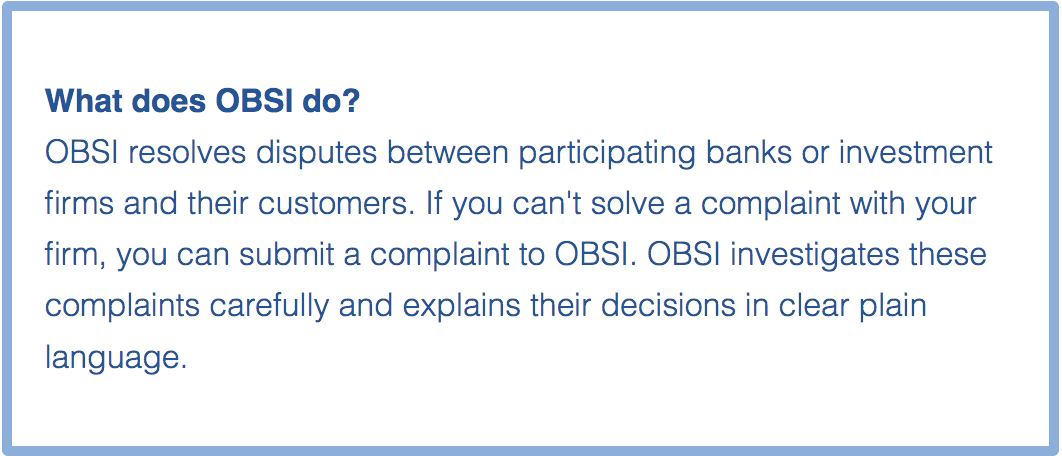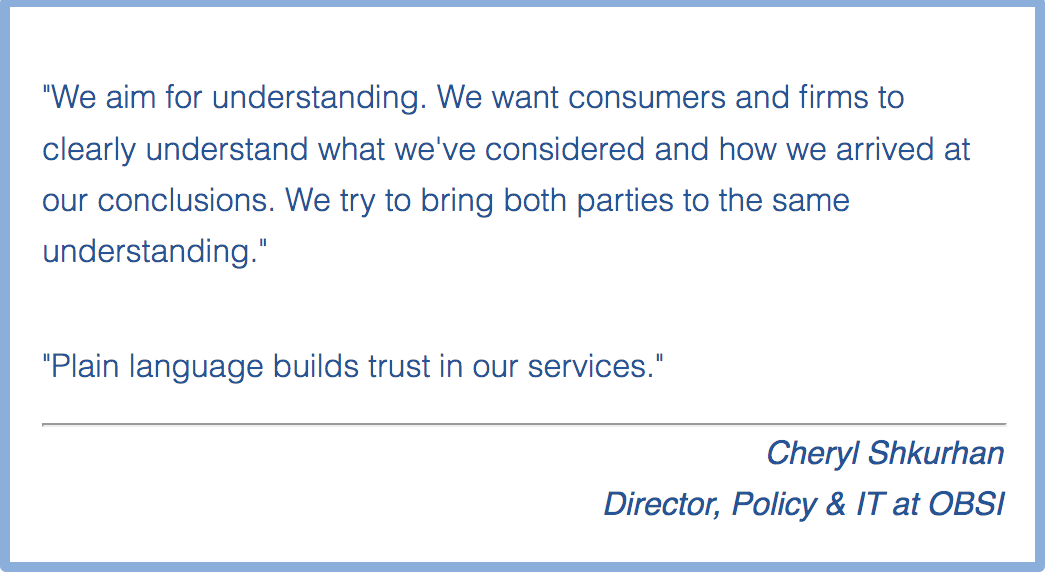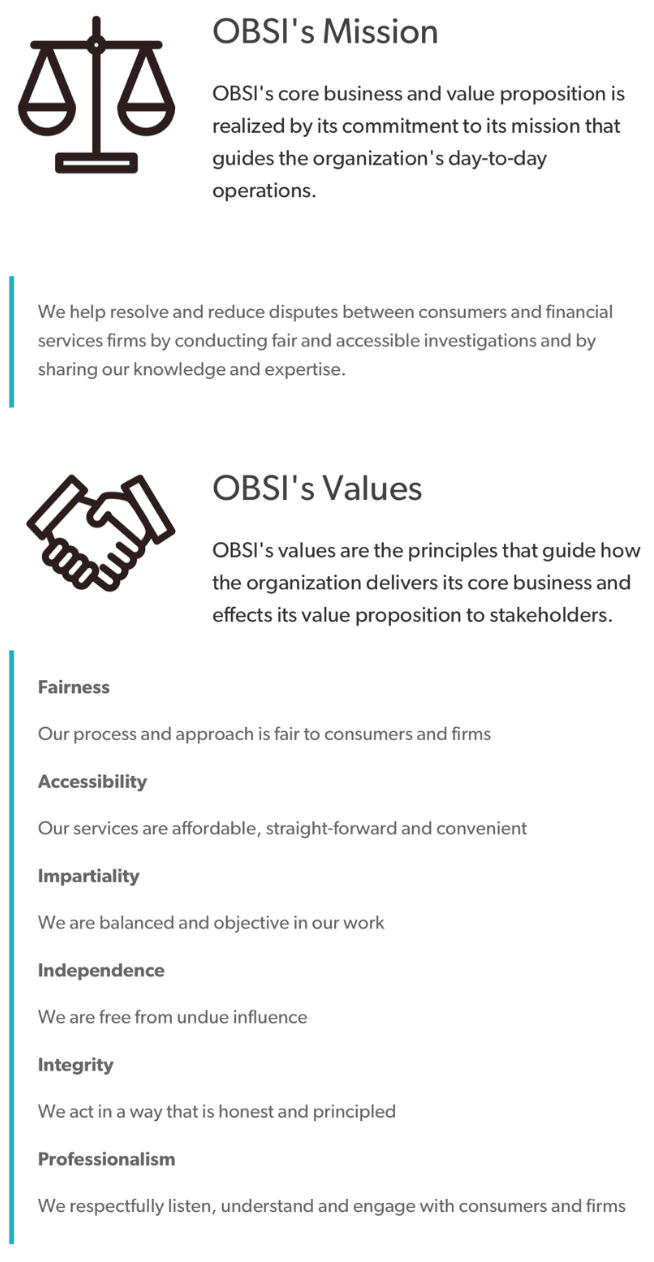Improve your documents’ efficacy and cost—a case study
We specialize in two areas
At Wordsmith, we focus on:
Documents—Do documents work for their intended readers and purposes? This is external facing functionality.
The process to produce them—How much time, money, and effort did the organization need to invest? Was it efficient? This is internal facing functionality.
Tackling these two things as an organization really truly improves documents, their effectiveness, and saves money all at the same time. We have witnessed plenty of real-world examples.
A real-life success story
Communicating complex financial concepts simply and efficiently
The Ombudsman for Banking Services and Investments (OBSI), an organization that resolves financial complaints, has committed to communicating in ways that consumers understand.
Wordsmith has been helping OBSI achieve this goal for several years now. Although OBSI operates in a specialized and jargon-filled industry, their documents are extraordinary examples of clarity. Plain language has become, in their words, “the way we do things.”
The benefits of committing to plain language—it paid off!
OBSI is an outstanding example of what happens when you tackle writing—both externally and internally. Here are a few examples of how it’s paid off:
1. Their documents work better
The consumers who bring their complaints now regularly tell investigators, “I felt heard” and “You were the first person who helped me understand, thank you.” Astonishingly, many say this even when they don’t receive the decision they were hoping for. At Wordsmith, we’re fond of saying clear documents change the world. This is one concrete example!
Their documents work better because they translate complex financial concepts that they understand into terms everyone can understand.
Let’s look at an example of this philosophy in practice. Here is an excerpt from a letter OBSI sent to a consumer explaining an important limit on the complaints they are able to investigate. Imagine how this would sound if it used only internal, technical, or legal language:
OBSI has a six-year limit on complaints. This means we can only work with a complaint if it relates to something that you could have complained about in the last six years. This six-year limit is built into our mandate, and it follows the same model as the court system—we can’t consider a complaint if someone waits too long to bring it to our attention.
In another post, we looked at the Financial Consumer Agency of Canada guidance on plain language. The excerpt above does a lovely job of achieving that standard! You can see many more examples on OBSI’s website.
2. Their process works better—OBSI cut down the time it takes to produce documents
Improving documents isn’t the only important effect OBSI experienced. The amount of time it takes OBSI to generate, review, and publish reports has dropped by almost half. (Writing was historically the longest component of their investigation timeframes, and it has come way down in the last few years.) It has also empowered OBSI staff and made writing much less of a grind, which makes everyone happy!
Tackling writing problems on the process level increases the power of the whole organization to do its job—less time to produce documents means greater capacity to focus on investigations.
This is lucky because OBSI’s overall case load increased by nearly 60% since COVID began (and continues to climb) making this efficiency essential. As a consequence of their greater efficiency, they can keep up to demand and continue to offer their services with a very small staff.
How did OBSI improve documents and reduce costs?
The biggest move OBSI made was committing to plain language as an organization. This meant tackling both levels we mentioned above: external and internal. Here’s a snapshot of that commitment. As an organization, they:
Trained all their staff—All OBSI’s staff went through our clear-language training—both foundational writing training as well as document-specific workshops to tackle trickier problems. As a result, everyone shares a common vocabulary and approach.
Updated templates—An effective template is a writer’s best friend, but an ineffective or outdated template recycles the same problems over and over. Together, OBSI and Wordsmith created templates for common documents that:
work for the reader
reflect the standard of writing OBSI wants to achieve
includes guidance to writers within it (and offered training on how to use them)
Created a standard—OBSI has a one-page list of principles to apply to properly capture the voice and style of the organization. All their writers and reviewers are committed to these principles and support one another to meet them. This:
improves consistency
makes edits objective rather than subjective
reduces back-and-forth and the number of edits overall
Streamlined their organizational writing process—They looked at their levels of review, and articulated what kind of edits should happen at what stage. They also added a peer review step, which saves time early in the process and minimizes the number of edits at higher levels.
Offered individual coaching to staff—If you’re a writer, coaching gives you an accurate sense of where you stand, what you’re doing well, and where you can improve. OBSI has supported and empowered writers so they have the feeling they got it right.
We admire the investment OBSI has made in plain language and are excited to follow the rewards they continue to reap, both in their public-facing capacity and internally. It has strengthened their ability to do very important work, and increased the enthusiasm and empowerment in their staff.
Let’s continue to change the world, one document (and process) at a time!




